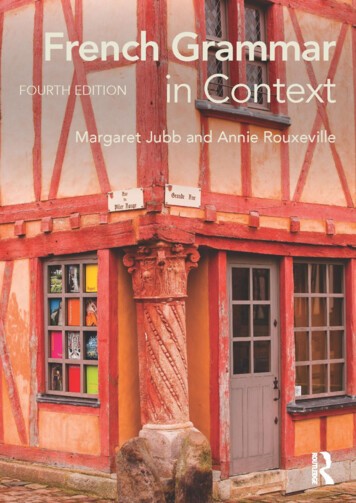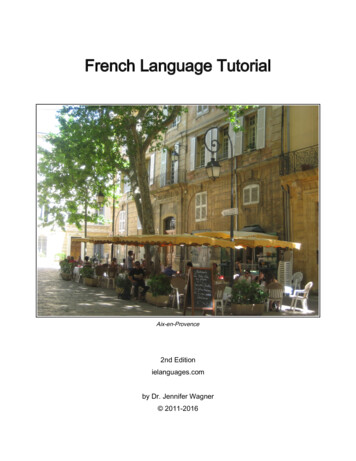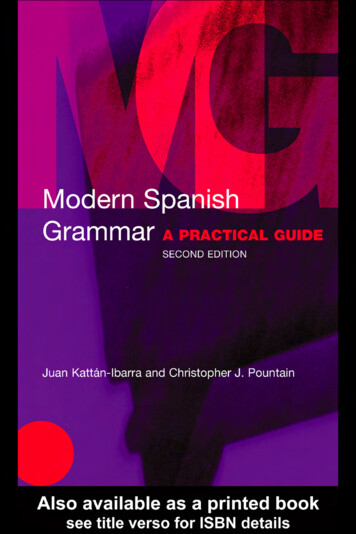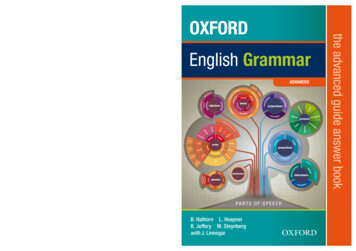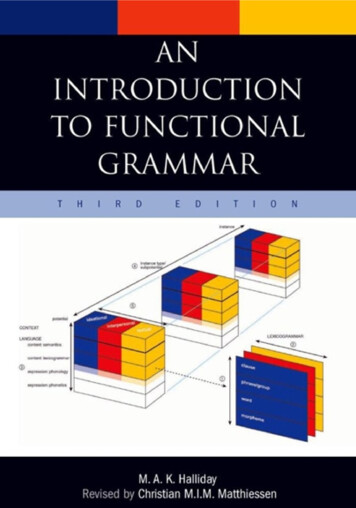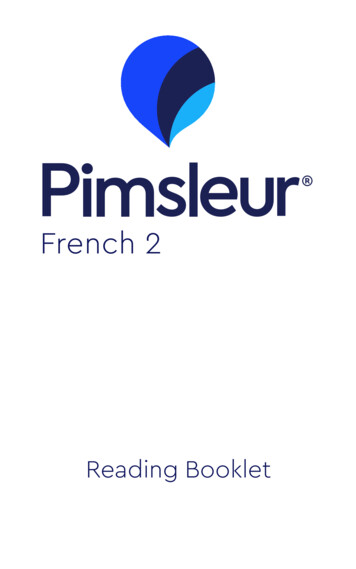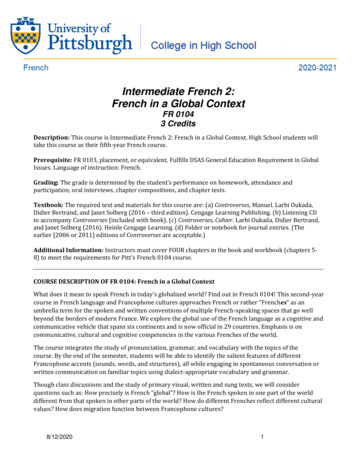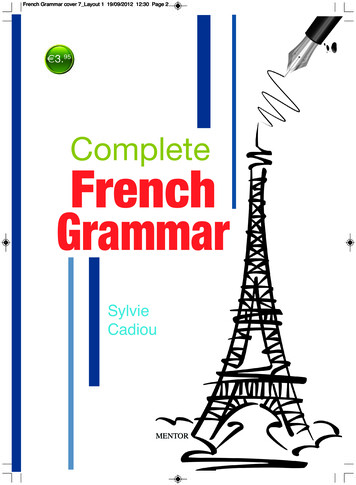
Transcription
French Grammar cover 7 Layout 1 19/09/2012 12:30 Page 2 3.95CompleteFrenchGrammarSylvieCadiouMENTOR
CONTENT SIntroduction: . 3Part 1: Basic Elements . 4Première Partie: Éléments de base. 4Chapter 1: Articles . 4Chapter 2: Nouns . 7Chapter 3: Adjectives . 9Chapter 4: Prepositions and Conjunctions . 15Chapter 5: Pronouns . 20Chapter 6: Verbs . 27Chapter 7: Adverbs . 48Part 2: Going Further. 50Deuxième Partie: Approfondissement . 50Chapter 8: More Tenses . 50Chapter 9: More Pronouns . 58Part 3: The Sentence. 66Troisième Partie: Le Phrase . 66Chapter 10: Putting the Jigsaw Together . 66Grammar Terms in French . 75French Grammar.indd 29/20/12 10:45:11 AM
Chapter 6: VERBSWhen you look up a verb in the dictionary, it is given to you in the infinitive, meaning themost basic form of the verb before anything is done to it. In English, infinitives are the toform of the verb, e.g. to play.The infinitive in French can be used in a sentence but it will nearly always be with anotherverb, e.g. je vais jouer I am going to play.It is also used to express the –ing form of an English verb, when that –ing form has themeaning of to, e.g. I like playing ( to play) football j’aime jouer au football.All infinitives in French end in ER, IR or RE. This is an obvious way of grouping them, whichis why you have three families of verbs: the ER verbs, the IR verbs and the RE verbs. Ofthese three families, the ER verb family is by far the biggest. The majority of ER verbs areregular verbs.Regular verbs, from the word règle meaning rule, are well-behaved verbs that follow the samerules. Once you learn a rule, all regular verbs will follow it, enabling you to use verbs you maynot have known before.But of course, in every good family, there is a black sheep or two. French verb families havetheir black sheep too; they are called irregular verbs. In other words, they do not followrules. With them, all bets are off. You therefore have to learn how they behave in the presenttense, the passé composé etc on a case by case basis.The most useful irregular verbs to know are:avoir to haveêtre to bealler to gofaire to do or to makeprendre to takeYou can call these the Famous Five (Le Club Des Cinq in French!).TensesA verb will change according to the subject used but also according to the tense you’re using,i.e. a verb in the future (je jouerai I will play) does not look like a verb in the past (je jouais- I used to play) - how else would we know which is which?!25
French GrammarA quick overview of essential tensesExample: jouer with je as the subject:Gone ByNow or RegularlyYet to ComeUnsurePassé Composé-What happenede.g. j’ai jouéPresent tense-What happens-What is happeninge.g. je jouePresent with contexte.g. je joue demainConditional-What would happene.g. je joueraisImperfect-How it was-What was happening-Used to happene.g. je jouaisFuture-What will happene.g. je joueraiImmediate Future-What is going to happene.g. je vais jouerImmediate Past-What just happenede.g. je viens de jouerThe Present TenseYou use the present tense to say how things are, e.g. I am tall; she is Irish.You also use the present tense to say what you do regularly and what you’re doing rightnow. In English, there are two different way of spelling your verb. In French, there is only one:I do French in school je fais du français à l’écoleI’m doing French at the moment je fais du français en ce momentYou have to say do.This applies to all verbs, not just faire, e.g. she sings or she is singing elle chante.The present tense is also used in phrases with depuis (since/for).Example: il travaille ici depuis six mois.That sentence in English would be he has been working here for six months.Formation of the Present Tense with Regular VerbsAs regular verbs follow rules, your task can be simplified by learning the rules for each tense.You don’t have to learn each verb individually, like you have to do with irregular verbs.Here is the rule for putting a regular verb in the present tense:1. Remove the ER, IR or RE from the infinitive. This gives you the stem. You will have toadd endings to the stem.2. Add the correct ending to the stem, according to the grid on the top of the next page:26
Chapter 6: VERBSFor ER verbs, add:For IR verbs, add:For RE verbs, add:For jeeissFor tuesissFor il; elle;ce; ça; oneit(nothing)For nousonsissonsonsFor vousezissezezFor ils; ellesentissententExample: You want to say my sisters like pop music. First, identify to like in French. That’saimer, which is a regular ER verb. The pronoun you use to replace my sisters with is they,feminine, i.e. elles.Now, apply the rule:Remove the ER from aimer. This gives you the stem aimCheck the grid. You need the first column, as it deals with ER verbs.1. Read down through the list of persons until you find elles.2. You need to add –ent to the stem.g mes sœurs aim- -ent la musique pop mes sœurs aiment la musique pop.Examples: je regarde; tu choisis; elle attend; nous vendons; vous adorez; ils grandissentA few spelling exceptions1. When the verb ends in –ger, the nous form ending is –eons, e.g. nous mangeons. That’s tokeep the soft sound of that g.The letter g is hard when it is followed by a, o or u, e.g. le golf, la gare and soft when followedby e or i. That’s why there is a u in words like guitar/la guitare. It would begin like giraffeotherwise.2. For the same reason, verbs ending in –cer keep that soft s sound by using a ç in front of the–ons ending, e.g. nous commençons.3. Verbs ending in –yer only keep that y with the nous and vous forms. All the other personsuse i instead, e.g. envoyer g j’envoie/tu envoies but nous envoyons/vous envoyez.Some verbs play fast and loose with accents:Some verbs with no accents in the infinitive have them in the present tense, but not witheach person:acheter g j’achète, tu achètes, il achète; nous achetons; vous achetez; ils achètentse lever g je me lève ; tu te lèves ; il se lève ; nous nous levons ; vous vous levez ; ils se lèventVerbs with acute accents in the infinitive don’t always keep those accents acute:préférer g je préfère; tu préfères; il préfère; nous préférons; vous préférez; ilspréfèrent27
French GrammarIrregular verbs: The Famous Five in the present tenseAVOIRETREALLERFAIREPRENDREWith je or j’aisuisvaisfaisprendsWith tuasesvasfaisprendsWith il; elle;ce; ça; onaestvafaitprendWith nousavonssommesallonsfaisonsprenonsWith vousavezêtesallezfaitesprenezWith ils;ellesontsontvontfontprennentExamples: tu prends; j’ai; ils vont; ça va; nous sommesEXE RC I C E S1. Translate the following phrases into French. All the verbs are regular.(a) She chooses (to choose choisir)(b) We’re playing (to play jouer) – Give two ways of saying this.(c) The boys are singing (to sing chanter)(d) Do you like.? (to like aimer) – use the casual you.(e) He waits (to wait attendre)(f) The little girls are growing up (to grow up grandir)(g) You sell (to sell vendre) – use the polite you.(h) I wash (myself) (to wash se laver)**Se laver is a reflexive verb, like s’appeler. Remember, most reflexive verbs are regular ERverbs. The only difference is the reflexive pronoun that has to be added, e.g. tu te réveilles.See page 22.28
Chapter 6: VERBSEXE RC I C E S2. Match the subject to a suitable irregular verb, then finish the sentence yourself andsay what it means, e.g. je fais du français I do French/I am doing French.PaulMes amisLa sourisEllesMarilyn et moiTuToi et ta d)(e)(f)(g)(h)3. In the following sentences, fill in the gaps with a suitable regular or irregular verb inthe present tense. Then translate each sentence into English:(a) Mes voisins anglais.(b) J’ trois chiens.(c) Mes stylos dans ma trousse.(d) On du chocolat.(e) Vous le bus ?(a)(b)(c)(d)(e)29
French GrammarThe Present ParticipleFirst, let’s see what a present participle is in English.Look at the following example:John likes playing cards.There are two words in the verbal group in this sentence: likes playing.These two verbs have different meanings and the second verb ends in -ing. This secondverb is a present participle in English.The present participle in English can also be used after prepositions such as by,e.g. By leaving early, we’ll be in Montpellier before twelve.The present participle in French behaves a bit differently.In the sentence John likes playing cards, the French use an infinitive, not a present participle,for the second verb, e.g. John likes playing cards John aime jouer aux cartes.Basically, if you can replace the verb ending in -ing (e.g. playing) with a verb startingwith to. in English, you will use an infinitive in the French translation,e.g. John likes playing/to play John aime jouer.However, you need to use a present participle in French when you use a verb withen ( by, on/upon or whilst).Examples:Tu réussiras en travaillant dur You will succeed by working hard.En arrivant, on a pris le Métro On arriving, we took the Métro.Je suis tombé en jouant au hockey I fell whilst playing hockey.You can see how the present participle could be really useful (and impressive!)in your written work.The way to form the present participle is to look at the nous form of any verb in thepresent tense (ER, IR or RE) and remove the –ons ending. This gives the stem, to whichyou add – ant.Example: To translate playing.we play nous jouonsRemove the –ons to get the stem g jouAdd –ant g jou- -ant jouantjouant playing28(Three exceptions: being étant; having ayant; knowing sachant)Sometimes, there is a need for the present participle in French, but not in English. Englishis a wonderfully elastic language where you can say things like, he ran out of the room . The
Chapter 6: VERBSFrench language is not so nimble and that sentence in French has to be he went/came out ofthe room running. To express that, you need the present participle. g il est sorti de la pièceen courant.In English and in French, the present participle is also used to create adjectives out of verbs,e.g. charming comes from to charm; in French, charmant come from charmer. However, likeall adjectives in French, present participles used as adjectives agree with their noun.Example: un film intéressant/une histoire intéressanteNoteRemember that in English, not all verbs ending in -ing are present participles.Look at this example: John is playing cards.You cannot replace playing with to play in the example.The verbal group is playing is in the present tense and the sentence translates into Frenchas, John joue aux cartes. You do not translate the is nor the playing seperately.EXE RC I C E STranslate the following sentences into French:(a) I saw Marie when on my way ( while going) to school. (to go aller)(b) I went in by opening the door. (to open ouvrir)(c) I went in shouting. (to shout crier)(d) He listens to music whilst waiting for the bus. (to wait for attendre)(e) She broke her leg whilst skiing. (to ski faire du ski)(a)(b)(c)(d)(e)The Passé ComposéAlso known as the perfect, the passé composé is the tense you use to say what happened.You use it to talk about something that happened just once in the past (e.g. I went to thecinema, I have eaten an apple), rather than something you regularly used to do in the past.The passé composé means composed past, so remember you will need to combine TWO words.The first word of the passé composé is called the auxiliary. It is either avoir or être in theirpresent tense forms.The second word is called the past participle. It carries all the meaning, as in English.For example, I have done that.Have the auxiliary. Done the past participle.In French, you will always need both the auxiliary and the past participle.29
French GrammarFirst, find out the infinitive ( verb itself as in To do) of the verb you want to use. Then, youneed to find out which auxiliary to use, so ask yourself the following questions:infinitiveIs your infinitive a reflexiveIs your infinitive in this list?verb? (e.g. se lever)aller to govenir to comeentrer to enter/go inrentrer to go back in/to go homesortir to go outarriver to arrivepartir to leavemonter to go updescendre to go downrester to staytomber to fallretourner to returnnaître to be bornmourir to dieNote: these verbs can be learnt inpairs of opposites (e.g. aller/venir)or remember them with this phraseMrs Van Der Tramp (M forMonter, R for retourner, etc )You will need one of these asyour first word ( auxiliary):(this is the(je) suis(tu) esêtre verb)(il/elle/on) est(nous) sommes(vous) êtes(ils/elles) sontNote: Don’t forget the reflexivebit, e.g. je me suis, if needed.32Is your infinitive neitherreflexive nor in the list?You will need one of these asyour first word ( auxiliary):(j’) ai(this is the(tu) asavoir verb)(il/elle/on) a(nous) avons(vous) avez(ils/elles) ont
Chapter 6: VERBSNow you need a second word, the past participle, so go back to your original verb in the infinitive and ask yourself these questions:infinitiveIs your verb an ER verb?Is your verb regular?To get your second wordTo get your second word( past participle), remove ( past participle), followthe ER at the end of yourthis rule:verb and replace it with éIf your verb is a regular IRe.g. jouer g jouéverb, replace the IR with ie.g. finir g finiIf your verb is a regular REverb, replace the RE with ue.g. vendre g venduIs your verb irregular?If your verb is irregular, you can’tapply any rule. You must learnthe list of irregular past participles. Here is a list of common irregular past participles:bu drunkcru believedcouru rundit saiddormi sleptdû had toeu had/gotécrit wri enété beenfait done/madelu readmis putmort died / deadné bornouvert openedparti le pris takenpu been able toreçu receivedri laughedsorti gone outvu seenvoulu wanted33
French GrammarNow, put your first word (auxiliary) and your second word (past participle) together and youhave a passé composé.Example: You want to say I visited the Louvre and I saw the Mona Lisa. First, to visit is visiterand to see is voir.Visiter is not reflexive (it’s not se visiter) and it’s not in the Mrs Van Der Tramp list, so we willneed avoir as the auxiliary. The person (i.e. the subject of the verb) you want is I so you lookfor the je form in the avoir box and you find j’ai. Visiter is an ER verb so you remove the ER andreplace it with é, this gives you visité. Put the two together and you get: j’ai visité.Now, do the same with voir. It’s not reflexive, it’s not in the Mrs Van Der Tramp list so it’s an avoirverb again. You start with j’ai again. Voir, however, is irregular so consult the irregular pastparticiples list. There, you look for seen and you find vu. Put the two together and you get: j’aivu.The whole sentence is: J’ai visité le Louvre et j’ai vu la Joconde (la Joconde is what the Frenchcall the Mona Lisa.)One last thing to take into account: if your auxiliary is être, your past participle will have toagree with the subject, i.e. take an e for the feminine singular, s for masculine and mixed pluralsand es for feminine plurals.Example:Julie says je suis alléeThomas and Marc say nous sommes allésJulie and Marc say nous sommes allés alsoJulie and Florence say nous sommes allées.When on is used as a casual nous, the past participle also agrees, e.g. on est parti(e)s.EXE RC I C E S1. Fill in the gaps with the missing auxiliary:(a) Tu regardé la télé hier soir?(b) On partis à huit heures.(c) Ils vu la Joconde au Louvre.(d) Je descendue dans le sud de la France.(e) Elle joué au tennis avec son frère.322. Fill in the gaps with a suitable past participle:(a) Nous avons le film.(b) Il est en ville.(c) Vous avez une lettre.(d) J’ai un garçon sympa en colonie de vacances.(e) Elles sont ce matin.
Chapter 6: VERBSEXE RC I C E S3. Match an iten from Column A to an item from Column B to make five sentences.ABElle apris le trainNous sommesjoué au foutTu asmonté dans l’avionIl estfini tes devoirsVous avezarrivés en retard(a)(b)(c)(d)(e)The ImperfectThe expressions in the imperfect listed below are the most common.It is worth learning these expressions as you will meet them (and write/say them) yourself.J’étais I was; J’avais I had/I used to have; C’était it was; Il y avait there was;Il faisait the weather was; Il pleuvait it was rainingHowever, the imperfect is the other important past tense. Whereas the passé composé dealswith what happened, the imperfect deals with what was happening, what used to happenand how things were. When it comes to telling a good story about something that has alreadyhappened, you will need both tenses.How to Form the ImperfectThe way to form the imperfect is to identify the nous form of your verb in the present tenseand remove the–ons ending (and the nous!). This gives you the stem.To that stem, you will need to add the correct ending. The good news is that you use thesame endings for an ER verb, an IR verb or an RE verb.Add this ending:ForForForForForForje or j’tuil; elle; ce; ça; onnousvousils; ellesaisaisaitionsiezaient33
French GrammarExamples: You want to say I was watching TV. The verb to watch is regarder. You need we watchto find the stem g nous regardons.Remove the –ons. This gives the stem regardCheck the grid for the correct ending. You need the I form, that’s je in French,so the ending is –ais.Put the two together: je regard- -ais g je regardais la télé.You will notice that we did not translate the verb literally. There is no was and no watching. Infact, je regardais could mean I was watching or I used to watch. You need to know the contextto know which one it means in English.If you want to say it was, you need the verb être which has an exceptional stem.You need to use ét-.Check the grid for the correct ending. It is ce , so you’ll need the ending –ait.Put everything together and you get ce ét- -ait g c’était. (ce will become c’ because étaitstarts with a vowel)Examples: j’aimais; tu regardais; vous alliez; ils faisaientEXE RC I C E SPut the verbs in brackets into the imperfect:(a) Ils (aller) souvent au cinéma.(b) Je (regarder) la télé quand Mathilde est arrivée.(c) Vous (finir) de manger?(d) Nous (étudier) le Latin quand j’ (être) jeune. Note: the stem of étudier is étudi-,so yes, you’ll need to write the letter i twice!(e) Il y (avoir) du brouillard sur la route.Clash of the Titans: Passé Composé versus Imperfect34The main difficulty with these two past tenses is that they can occur in the same sentence.You need to be careful or your story could be very different to the one you intended to tell!Compare these two examples:(a) Le téléphone a sonné quand je prenais un bain.(b)Le téléphone a sonné quand j’ai pris un bain.Example (a) means that the phone rang when I was taking a bath. In other words, I was alreadycovered in suds when the phone rang.Example (b) means that the phone rang when I took a bath. It sounds as if the phone waitedfor me to get in the bath before ringing!This shows that you must decide which of the two tenses to use. It all depends on what youmean.
Chapter 6: VERBSLook at the these example:(a) il pleuvait it was raining(b) il a plu it rainedIn example (a), you’re giving more of a description, it implies the rain was falling for a while.In example (b), you’re merely stating the fact that it rained, you’re not passing judgement.In most cases, there will be a clear choice to make between the two tenses.To help you with that, have a look at the following checklist:AAre you being factual, objective, and saying merely what happened? That’s the passécomposé, e.g. Je suis allé en ville: I went into townBAre you referring to a once-off event in the past?That’s also the passé composé, e.g. J’airecontré le Président: I met the PresidentCAre you setting the scene by saying what you were doing when something elsehappened? That’s the imperfect, e.g. Je regardais la télé quand tu es arrivé: I was watchingTV when you arrivedDAre you referring to something you used to do, concentrating on the length or therepetitive aspect of the action and not just the fact that you did it? That’s the imperfecte.g. J’aimais bien ce groupe mais plus maintenant: I used to like this band but not anymoreEAre you offering an opinion or a description, in other words, are you being subjective?That’s the imperfect, too, e.g. C’était super, il y avait plein de choses à faire: It was brilliant,there was lots to doFFor these reasons, the passé composé carries a story forward but the imperfect doesn’t,e.g. il faisait beau (imperfect), j’ai fait une promenade (passé composé): the weather wasgood (the story is static), I went for a walk (the story moves forward). You can think ofit as a film: the imperfect is everything in the background, the passé composé is theaction.35
French GrammarHere are two stories told using both the passé composé and the imperfect. The first oneclearly illustrates the contrast between what used to be the case and what happened next:Story 1Quand j’étais plus jeune, j’habitais en Angleterre. Mon père travaillait pour unecompagnie anglaise. On avait un appartement à Londres, c’était chouette! Il y a trois ans,on a déménagé et on est venus habiter ici. On a acheté une grande maison à la campagneet ça, c’est bien aussi!TranslationWhen I was younger, I used to live in England. My father was working for an English company.We had/used to have an apartment in London, it was great! Three years ago, we moved and wecame to live here. We bought a big house in the country and that’s great too! J’étais I wasJ’ai été I have been would not work here as it does not make sense to say I have been young.(Note: Generally speaking, être is more likely to be used in the imperfect than in the passé composé.) J’habitais en I lived in /I used to live in In this case, we are setting the scene so I used to live (i.e. the imperfect) is the best translation as itimplies that it was something you did for a while (i.e. you lived there for a while). I lived can betranslated from English into French as j’ai habité if you want to state the fact that at one time, you livedin . (e.g. I have lived in many different countries). Mon père travaillait My father used to work/was workingWe’re still setting the scene so we’re using the imperfect. It’s an explanation as to why they lived inEngland. Mon père a travaillé would not be right here as it would mean my father has worked. On avait We had/we used to haveIf the verb phrase on a eu had been used, it would actually change the story because avoir in the passécomposé is more likely to mean to get than to have, i.e. on a eu we got. So on avait is the imperfect. C’était it wasThis is one of the useful phrases in the imperfect given to you at the beginning of this section. It’sused to give all kinds of opinions, e.g. c’était nul it was rubbish, and other bits of backgroundinformation, e.g. c’était l’hiver it was winter. It’s the past version of c’est, so it is very useful. Lessuseful, but still an option, is the phrase ça a été it has been. On a déménagé We moved (house)This is the passé composé because we’re now talking about what happened, i.e something thathappened once. As the house move happened once and was a completed action, on déménageait(imperfect) would not work here as it means either we were moving or we used to move. On est venus We cameAgain, this is what happened just once. It doesn’t suit the story to say on venait we were coming/weused to come. Passé composé On a acheté We bought36This is clearly a once-off event that happened in the past, so it has to be passé composé. On achetaitimperfect means we used to buy or we were buying, neither of which suits our story.
Chapter 6: VERBSHere is another story in which the two tenses mix more freely:Story 2Samedi dernier, j’étais en ville pour faire quelques courses quand tout à coup, j’ai entenduune femme crier « Au voleur! Il m’a volé mon sac! » J’ai vu un jeune homme qui s’enfuyait.Il était grand et il courait vite. À un moment donné, un homme, qui avait de bons réflexes,lui a fait un croche-pied et le voleur est tombé par terre. Il s’est relevé très vite et il estreparti en laissant le sac derrière lui. La dame était très contente de retrouver son sacparce qu’il y avait tous ses papiers et ses cartes bancaires dedans. Le voleur, lui, n’a pas étéretrouvé!TranslationLast Saturday, I was in town to do some shopping when suddenly, I heard a woman scream ‘Stop,thief! He stole my bag!’ I saw a young man who was running away. He was tall and he wasrunning fast. At one point, a man who had good reflexes tripped him up and the robber fell tothe ground. He got back up quickly and he set off again leaving the bag behind. The lady was veryhappy to get her bag back because she had (there was) all her papers and bank cards inside. (Asfor) the robber, he has not been found again! J’étais I was We’re setting the scene. Imperfect J’ai entendu I heard This is a once-off event in the past, we’re saying simply what happened. Sothat’s passé composé. J’ai vu I saw This is a once-off event in the past, it’s what happened. Again, that’s passé composé. (qui) s’enfuyait (who) was running awayThis says that the young man had probably started running before our writer saw him and keptrunning (until he was tripped up in fact!). Imperfect If you say j’ai vu un jeune home qui s’est enfui,you’re saying I saw a young man who ran away. This sounds as if he ran away as soon as you lookedat him. This does not have the same meaning as I saw a young man who was running away. Il était he was You can’t really say he has been tall, (il a été), can you?! Imperfect Il courait he was running Again, that’s part of the description. We’re not saying he ran (il a couru).Imperfect (qui) avait (who) had That’s another description. Descriptions require the imperfect. (un homme) a fait (a man) did (faire un croche-pied à quelqu’un to trip somebody up)This is, luckily perhaps for the young man, a once-off event in the past, we’re stating what happened.A one-off event the passé composé. Le voleur est tombé the robber fell/il s’est relevé he got back up again/il est reparti he set off againAll these relate what happened. Passé composé (Note: Adding re- to the start of a verb can give themeaning of again, e.g. partir g repartir; commencer g recommencer)37
French Grammar La dame était the lady wasThis is a description. ImperfectNote the two words used in the extract to refer to the poor victim: la femme the woman;la dame the woman/the lady, a bit more friendly than la femme. Il y avait there wasThis is another of the essential expressions in the Imperfect. You use it to describe plenty of things,e.g. il y avait du vent it was windy (there was a lot of wind); il y avait beaucoup de monde au concert the concert was packed (there were a lot of people at the concert). Le voleur n’a pas été retrouvé the robber was not found againWe’re stating a fact, here. Passé composéNote the structures used: as you can see, it’s in the negative, using ne and pas. To say he has beenfound, you’d write il a été retrouvé. But look more closely and you’ll see that there are three words usedfor this passé composé. That’s because the phrase is in the passive voice. The passive voice in Frenchis formed much like in English: the verb être is used in various tenses, with a past participle, e.g. ellesera invitée she will be invited.EXE RC I C E S1. Choose between the passé composé and the imperfect in the following sentencesand explain your choice.(a) J’ai vu/Je voyais un bon film hier soir.(b) On est allés à la plage mais il a plu/il pleuvait.(c) Avant, ils ont joué/ils jouaient au rugby, mais ils ont arrêté/ils arrêtaient.(d) Tu as été/Tu étais malade ?(e) Il y a eu /il y avait un accident sur l’autoroute A4 dimanche.2. Translate the following sentences into French:(a) I fell when I was playing basket ball.(b) We went to a music festival, there were a lot of people there and we had a greattime! (Note: To have a great time is bien s’amuser. The word bien comes after theverb in one-word tenses [e.g. je m’amuse bien, present tense] and after the first verbin constructions using more than one verb [e.g. je vais bien m’amuser, immediatefuture].)(c) He used to take his car to go to work, but last year, he started taking the bus. (Note:to start doing something is commencer à infinitive.)(d) I saw the robber! He was fat, he had grey hair and he was wearing a blue jacket.(e) My parents and I were very sad when you left.38(a)(b)(c)(d)(e)
Chapter 6: VERBSThe Immediate PastThis
In English, there are two different way of spelling your verb. In French, there is only one: I do French in school je fais du français à l’école I’m doing French at the moment je fais du français en ce moment You have to say do. This applies to all verbs, not
